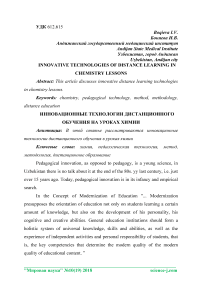Инновационные технологии дистанционного обучения на уроках химии
Автор: Бокиева И.В.
Журнал: Мировая наука @science-j
Рубрика: Основной раздел
Статья в выпуске: 10 (19), 2018 года.
Бесплатный доступ
В этой статье рассматриваются инновационные технологии дистанционного обучения в уроках химии
Химия, педагогическая технология, метод, методология, дистанционное образование
Короткий адрес: https://sciup.org/140263131
IDR: 140263131
Текст научной статьи Инновационные технологии дистанционного обучения на уроках химии
Pedagogical innovation, as opposed to pedagogy, is a young science, in Uzbekistan there is no talk about it at the end of the 80s. yy last century, i.e. just over 15 years ago. Today, pedagogical innovation is in its infancy and empirical search.
In the Concept of Modernization of Education "... Modernization presupposes the orientation of education not only on students learning a certain amount of knowledge, but also on the development of his personality, his cognitive and creative abilities. General education institutions should form a holistic system of universal knowledge, skills and abilities, as well as the experience of independent activities and personal responsibility of students, that is, the key competencies that determine the modern quality of the modern quality of educational content. ”
The world in which a teenager lives and is brought up is characterized by constant updating of information, it is dynamic and changeable. Such conditions dictate the need for him to see his goals, show initiative, design, build social connections and quickly join temporary teams and modern educational technologies.
In order to “turn on” the cognitive activity of students and direct it to solve the problem that has arisen, it must have something known, some kind of starting data for thinking, for a creative search. It is important that the problem situation contains some psychological element, consisting in the novelty and brightness of the facts, in the unusual cognitive task, etc. in order to excite students' interest and desire for informative search.
The development of a teacher's training technology is a creative process consisting in the analysis of goals, opportunities and the choice of forms, methods and means of training that ensure the realization of goals and opportunities. This and the choice of personal preferences of the teacher, practical - is a constant mental search and creative activity that requires additional effort from the teacher. For any kinds of teacher’s activities (training, educational and communicative) the technological chain of actions is one and looks like this:
Diagnostics (study and analysis) of the pedagogical situation (training, educational, situation of interpersonal and group interaction);
Goal setting - setting goals and specifying them in the system of tasks;
The choice of appropriate content, forms and methods, the creation of conditions for pedagogical interaction;
Organization of pedagogical interaction (training, educating, developing);
Feedback, assessment of current performance and their correction;
Final diagnosis, analysis and evaluation of the results of pedagogical interaction.
Today, the educational process is unthinkable without the search for new, more efficient technologies that promote the development of creative abilities of schoolchildren. The content of the program in chemistry significantly contributes to the memorization of students of the material, but does not develop creative mental activity. The chemistry teacher needs to apply innovative teaching technologies and innovative methods for demonstrating chemical reactions in his lessons.
The concept of a combination of innovative technologies that underlies the teaching of chemistry, gives the learner confidence in their own capabilities, creates positive emotions, eliminates unconscious resistance to the learning process. Thus, the student asserts himself as a person, he has an interest in the subject and in the very process of cognition.
During the demonstration of chemical experiments, information and communication technologies are used. ICTs make the lesson meaningful and vivid, develop the cognitive abilities of schoolchildren, their creative powers, help in studying the periodic table. The solution of the tasks is achieved through a series of multimedia lessons. Animation, sound and dynamic effects make learning material easy to remember. The use of computer programs in chemistry lessons allows you to simulate a chemical process, to conduct a dangerous reaction, which is impossible in a regular lesson.
Important in the study of chemistry is a chemical experiment. There is a teaching demonstration experiment, which the teacher performs on the demonstration table, and a student experiment, which includes practical work, laboratory experiments, as well as experimental tasks that students study at their workplaces.
Innovative methods for demonstrating chemical reactions include integration, which can be carried out at the following levels:
-
- interdisciplinary connections (with biology, mathematics, geography, physics, literature, with the subjects of the natural-mathematical cycle and the life cycle);
-
- integrated lessons, the conduct of which creates the conditions for the use of various tasks that contribute to the development of students' interest in the subject when discussing the academic theme.
Used soures:
-
1 . Интернет: www.dist-edu.ru ; www.hse.ru ; www.ui.usm.ru .
-
2 Каледина А.Н., Кушельман Н.В. Высшее учебное заблуждение. М.: «Дрофа», 2006. – 228 с.
-
3 Кларин М.В. Инновации в обучении. Метафоры и модели. М.: «Наука», 2014– 398 с.
-
4 . Педагогика: Учебное пособие для студентов педагогических учебных заведений / В.А.Сластенин, И.Ф.Исаев, А.И.Мищенко, Е.Н.Шиянов. – 4-е изд. – М.: Школьная Пресса, 2012. – 512 с.
Список литературы Инновационные технологии дистанционного обучения на уроках химии
- Интернет: www.dist-edu.ru; www.hse.ru; www.ui.usm.ru.
- Каледина А.Н., Кушельман Н.В. Высшее учебное заблуждение. М.: «Дрофа», 2006. - 228 с.
- Кларин М.В. Инновации в обучении. Метафоры и модели. М.: «Наука», 2014- 398 с.
- Педагогика: Учебное пособие для студентов педагогических учебных заведений / В.А.Сластенин, И.Ф.Исаев, А.И.Мищенко, Е.Н.Шиянов. - 4-е изд. - М.: Школьная Пресса, 2012. - 512 с.


